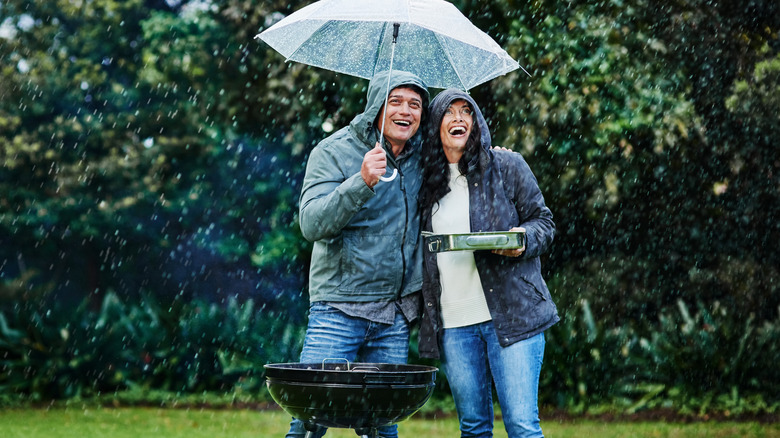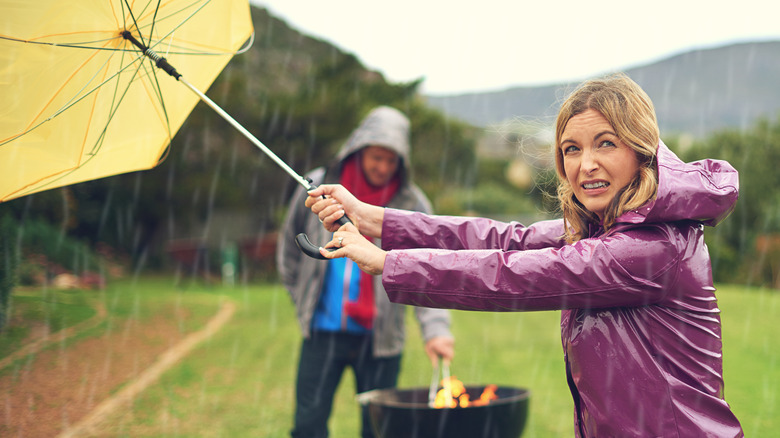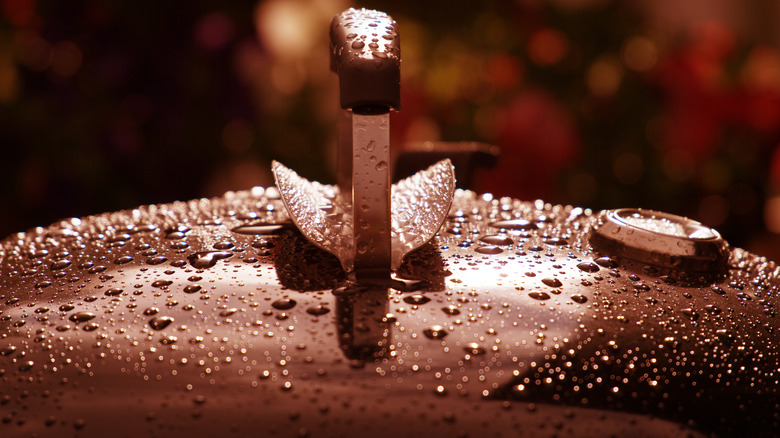Don't Let Bad Weather Stop You: What To Know Before Grilling In The Rain
Grilling is the great American pastime, a wonderful way to while away the hours with some delicious flame-cooked foods. But let's say you've been planning a big grill to-do, only it rains. Are you stuck ordering pizza? Not at all! Much like you don't have to give up grilling just because it snows, you can still grill even if it's raining out. You just have to know how to handle it. This is pretty easy if you have a carport or covered area — you can pretty much grill as normal under those circumstances as long as it's open on three sides and you have about 9 feet of clearance. But if you're out in the rain, there's a couple of things to consider.
The first is safety; you never want to risk your well-being just for your dinner (even if grilled food is delicious), because wet conditions can create some serious hazards. The second is the difficulty of actually lighting the grill and cooking your food, because there are temperature concerns that can cause you some problems if you're not prepared for them.
Safety should be your biggest concern
Safety is the first key here. If it's a hurricane or a torrential downpour, yeah, you're probably not going to want to grill. But even if it's a steady drumbeat of rain, you'll be fine as long as you're decked out in the right gear. Wear non-slip shoes, because you don't want to just fully beef it while hovering over hot flames and handling sharp cooking tools. Be sure to wear a poncho or raincoat, because getting soaked isn't all that fun. And whatever you do, don't use an electric grill in the rain. Electricity and water make for extremely volatile bedfellows, and you don't want to take the chance of electrocuting yourself.
If you've got a charcoal or propane grill, there are still issues to be aware of, even if you don't need to worry about your equipment delivering unsafe volts directly to your nervous system. Much like if you're smoking meat in cold weather, you have to account for the wind. This isn't just because it can knock your equipment over (although if you're dealing with winds strong enough for that, don't grill at all), but because it can mess with the airflow of your grill or smoker. Your best bet is to set something up — maybe a tarp, maybe plywood — to block the wind from hitting the grill.
Use high heat and pay close attention
Lighting the grill in the rain also presents problems. You're fine working with a gas grill, but charcoal is notoriously fickle even under ideal conditions, and water isn't going to help. Lighting the grill under an awning or patio umbrella before moving it out is an option, and putting a paper towel soaked with oil at the bottom is a helpful trick to use if your charcoal grill won't stay lit. Your best choice, though, might be using a chimney grill starter, which lights charcoal in no time.
You also have to grill at higher temperatures than you would on a sunny day. Your grill's air vents are going to let in a bit of rain, which will lower the temperature, so you need to compensate. Lump charcoal is better than briquettes for this, while kiln-dried firewood is superior to air-dried or fresh. Because you can't predict exactly how much the rain is going to lower the temperature, you also need to keep a close eye on your food.
Good news, though: You don't need to stand out in the rain the entire time to accomplish this. Use a wireless remote thermometer to monitor the temperature from indoors. Lastly, it can be good to use a buddy system to transfer what you've cooked from the grill to the house; have one person carry the covered trays of food while another carries an umbrella.


